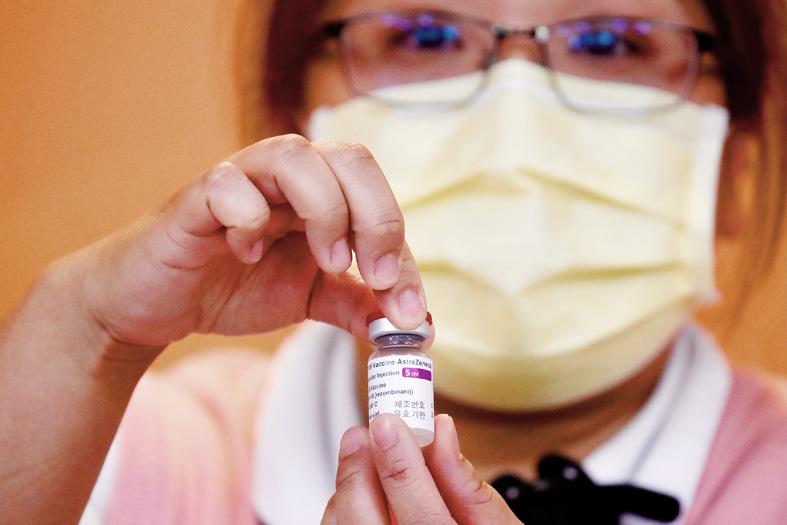The Financial Supervisory Commission yesterday gave Fubon Insurance Co (富邦產險) and Chubb Corp Taiwan (美商安達產險台灣) its approval to sell from today insurance policies that provide coverage to people experiencing serious side effects from COVID-19 vaccines.
Chubb’s product would pay compensation if a policyholder experiences side effects that require hospitalization or a stay in an intensive care unit (ICU), or if they die within 90 days of taking a COVID-19 vaccination, the commission said.
Fubon Insurance’s product has a shorter protection period, providing coverage for policyholders requiring treatment due to side effects within 14 days of being given a COVID-19 shot, the commission said.

.Photo: EPA-EFE
Asked whether the 14-day period was adequate, Insurance Bureau Deputy Director-General Wang Li-hui (王麗惠) told a news conference that the commission’s review focused on the fairness of the premiums.
However, consumers should carefully consider the insurance policies before making a purchase, Wang added.
The insurers said that they would not compensate policyholders if they received a COVID-19 vaccine abroad or a vaccine that had not been approved by local health authorities.
PAYOUTS
The insurers would use Central Epidemic Command Center data to determine which side effects could be attributed to a COVID-19 vaccine, they added.
Chubb’s product would pay its policyholders NT$3,000 (US$105.70) per day during a hospital stay, but payments would cease after the 15th day, while policyholders in an ICU would be offered a one-time payment of NT$30,000, the company said in a statement.
If the policyholder requires treatment again due to side effects of the second dose of a COVID-19 vaccine, they would again be compensated, Chubb added.
If the policyholder dies due to side effects from vaccination, their family or a beneficiary would receive funeral coverage of NT$300,000, it said.
Chubb has set a single premium for its product at NT$226 per year, regardless of the insured’s gender or physical condition, but only those aged 16 to 70 would be eligible, it said.
That was similar to Fubon Insurance’s annual premium of NT$228 for its product, which offers a one-time payment of NT$5,000 for those hospitalized and an additional NT$30,000 if their hospital stay exceeds five days, the company said.
Policyholders are compensated NT$30,000 if they test positive for COVID-19 within 180 days of getting vaccinated, Fubon Insurance added.
The compensation would increase to NT$10,000, NT$50,000 and NT$50,000 respectively if policyholders paid a higher premium of NT$365, the company said.

Sweeping policy changes under US Secretary of Health and Human Services Robert F. Kennedy Jr are having a chilling effect on vaccine makers as anti-vaccine rhetoric has turned into concrete changes in inoculation schedules and recommendations, investors and executives said. The administration of US President Donald Trump has in the past year upended vaccine recommendations, with the country last month ending its longstanding guidance that all children receive inoculations against flu, hepatitis A and other diseases. The unprecedented changes have led to diminished vaccine usage, hurt the investment case for some biotechs, and created a drag that would likely dent revenues and

Nvidia Corp’s GB300 platform is expected to account for 70 to 80 percent of global artificial intelligence (AI) server rack shipments this year, while adoption of its next-generation Vera Rubin 200 platform is to gradually gain momentum after the third quarter of the year, TrendForce Corp (集邦科技) said. Servers based on Nvidia’s GB300 chips entered mass production last quarter and they are expected to become the mainstay models for Taiwanese server manufacturers this year, Trendforce analyst Frank Kung (龔明德) said in an interview. This year is expected to be a breakout year for AI servers based on a variety of chips, as

Global semiconductor stocks advanced yesterday, as comments by Nvidia Corp chief executive officer Jensen Huang (黃仁勳) at Davos, Switzerland, helped reinforce investor enthusiasm for artificial intelligence (AI). Samsung Electronics Co gained as much as 5 percent to an all-time high, helping drive South Korea’s benchmark KOSPI above 5,000 for the first time. That came after the Philadelphia Semiconductor Index rose more than 3 percent to a fresh record on Wednesday, with a boost from Nvidia. The gains came amid broad risk-on trade after US President Donald Trump withdrew his threat of tariffs on some European nations over backing for Greenland. Huang further

HSBC Bank Taiwan Ltd (匯豐台灣商銀) and the Taiwan High Prosecutors Office recently signed a memorandum of understanding (MOU) to enhance cooperation on the suspicious transaction analysis mechanism. This landmark agreement makes HSBC the first foreign bank in Taiwan to establish such a partnership with the High Prosecutors Office, underscoring its commitment to active anti-fraud initiatives, financial inclusion, and the “Treating Customers Fairly” principle. Through this deep public-private collaboration, both parties aim to co-create a secure financial ecosystem via early warning detection and precise fraud prevention technologies. At the signing ceremony, HSBC Taiwan CEO and head of banking Adam Chen (陳志堅)